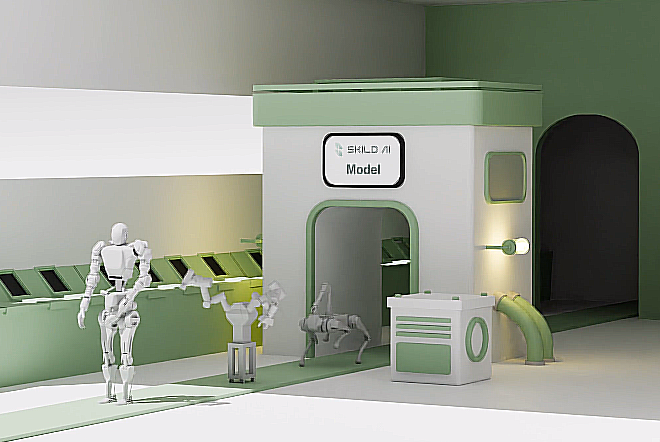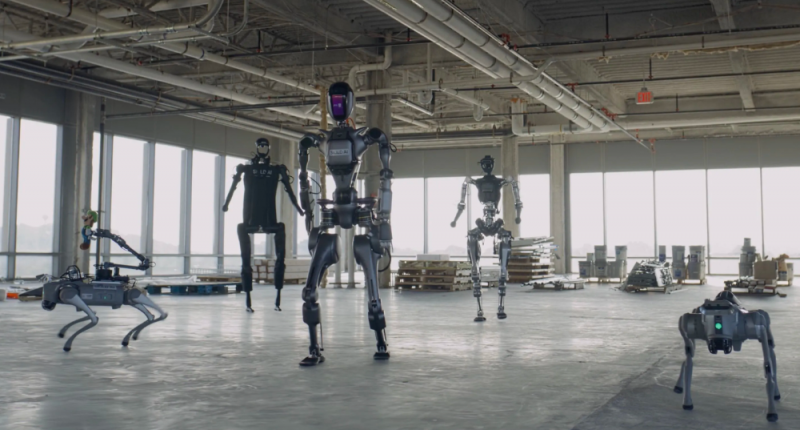 AI
AI
 AI
AI
 AI
AI
Skild AI, a startup that’s developing artificial intelligence-powered brains for robots, said today it has closed on a bumper $300 million early-stage funding round, bringing its valuation to a cool $1.5 billion.
The Series A round was led by a host of top-tier venture capital firms, including Lightspeed Venture Partners, Coatue, Softbank Group Corp. and Jeff Bezos’s Bezos Expeditions. It also saw participation from the likes of Felicis Ventures, Sequoia, Menlo Ventures, General Catalyst, CRV, Amazon, SV Angel and Carnegie Mellon University.
Skild AI is building what it says is a “shared, general-purpose brain” that will be able to equip a diverse group of robots that can perform multiple kinds of tasks in a wide range of scenarios, such as manipulating objects, locomotion and navigation. It says its AI intelligence can be integrated with any kind of robot, including humanoid bots with advanced computer vision skills designed to perform dexterous manipulation of objects in the home and in industrial settings, and more resilient quadruped robots that can navigate any physical environment.
The startup explains that robots, no matter what job they’re intended for, require “brains” to perform tasks independently. Traditionally in the robotics industry, these robot brains have alway been extremely specialized, focused on performing a very narrow range of tasks. But Skild AI wants to change that with its single, off-the-shelf AI brain that can be plugged into any robot and enable it to perform a whole host of different operations.
Skild AI’s co-founders are two former Carnegie Mellon University professors, Deepak Pathak (pictured, left, next to Sequoia Capital Partner Stephanie Zhan) and Abhinav Gupta (right), and their main innovation is a foundational model that acts as a “general-purpose brain” for robots. Equipped with this brain, robots will be able to handle various tasks immediately, such as climbing steep slopes, navigating past obstacles in its path and identifying and picking up items.
The company claims that it can make any kind of robot more agile and dexterous, and safer at human interaction. It believes there’s a desperate need for robots in the workforce too, citing the “massive labor shortage” in the U.S. that has grown to more than 1.7 million available jobs, with the biggest shortfalls in industries such as construction, healthcare, manufacturing and warehousing.
It cites data from the U.S. National Association of Manufacturers, which forecasts there will be more than 2.1 million unfulfilled jobs in the manufacturing sector alone by 2030. Many of those jobs involve repetitive, mundane tasks, and some can be dangerous too, so Skild AI believes it makes sense to use robots to perform them wherever possible.

Lightspeed partner Raviraj Jain told Forbes that he saw Skild AI’s AI brain being stress-tested in a number of robots earlier this year, explaining they were able to perform tasks he’d never seen robots doing before. “The robots at that time were able to climb stairs, and I think it’s really crazy how well they were able to do it because it’s a very complex stability problem,” he said.
In addition, what really sets Skild AI’s models apart is that they can help robots to perform tasks they were never even trained to do. These “emergent capabilities” are generally quite simple actions, such as picking up an object that the robot drops on the floor, or rotating an object to manipulate it better. But they’re impressive, as they show that Skild AI’s robots can learn on the job.
Skild AI said its AI models were trained on a database that is “1,000 times larger” than those used by rival AI robot startups. The database it used is said to have been collected in various ways, for example by hiring human contractors to operate robots remotely and teaching them to perform tasks this way. It also included hundreds of hours of public videos, the co-founders said.
Skild AI’s Pathak, who serves as the startup’s chief executive officer, said the company’s foundational model demonstrates unparalleled generalization and emergent capabilities, and has significant potential for automation in real-world environments. “We believe Skild AI represents a step change in how robotics will be scaled, and has the potential to change the entire physical economy,” he said.
Gupta, the company’s president, said that by enabling robots to safely perform any automated task in any environment, “we can expand the capabilities of robots, democratize their cost, and support the severely understaffed labor market.”

The two co-founders boast a lot of pedigree in the AI and robotics industries, with more than 25 years experience between them. During their careers, they have been credited with breakthroughs in areas such as self-supervised robotics, curiosity-driven agents and adaptive robot learning. They’re backed by a team of robotics experts who previously worked at big tech firms such as Google LLC, Meta Platforms Inc., Tesla Inc., Nvidia Corp. and Amazon.com Inc.
Holger Mueller of Constellation Research Inc. told SiliconANGLE that when it comes to humans, having more knowledge is always a good thing, and the same is true for robots. “That’s especially true when robots need to make sense of the real world to operate successfully in it,” he said. “This is what Skild AI is working on, massively expanding robot AI’s training datasets to provide them with more general knowledge. I’m eager to see what its robots can do in the real world.”
The pair intend to operate a business model that’s similar to OpenAI, essentially selling access to its robotic AI brain. So customers will be able to create robots that can perform various tasks and use cases, by fine-tuning its foundational model.
Jain’s enthusiasm for the company could barely be contained. “We believe it’s a one-of-a-kind company that could redefine our notions of what machines are capable of,” he said. “Deepak and Abhinav have been catalysts of advancements in robotics, and their innovation around leveraging the core principles of foundation models into the real world puts the industry on the path of general-purpose robotics.”
Sequoia Capital’s partner Stephanie Zhan is equally excited, and believes Skild AI is set to drive a “GPT-3 moment” for the world of robotics. “It will spark a monumental shift that brings advancements similar to what we’ve seen in the world of digital intelligence,” she said, but this time they will occur in the physical world.
Looking ahead, Skild AI intends to use the funding from today’s round to continue scaling its foundational robotics AI model while planning for the future commercial deployment of its technology. It also plans to expand its AI, robotics, engineering, operations and security teams.
Support our mission to keep content open and free by engaging with theCUBE community. Join theCUBE’s Alumni Trust Network, where technology leaders connect, share intelligence and create opportunities.
Founded by tech visionaries John Furrier and Dave Vellante, SiliconANGLE Media has built a dynamic ecosystem of industry-leading digital media brands that reach 15+ million elite tech professionals. Our new proprietary theCUBE AI Video Cloud is breaking ground in audience interaction, leveraging theCUBEai.com neural network to help technology companies make data-driven decisions and stay at the forefront of industry conversations.